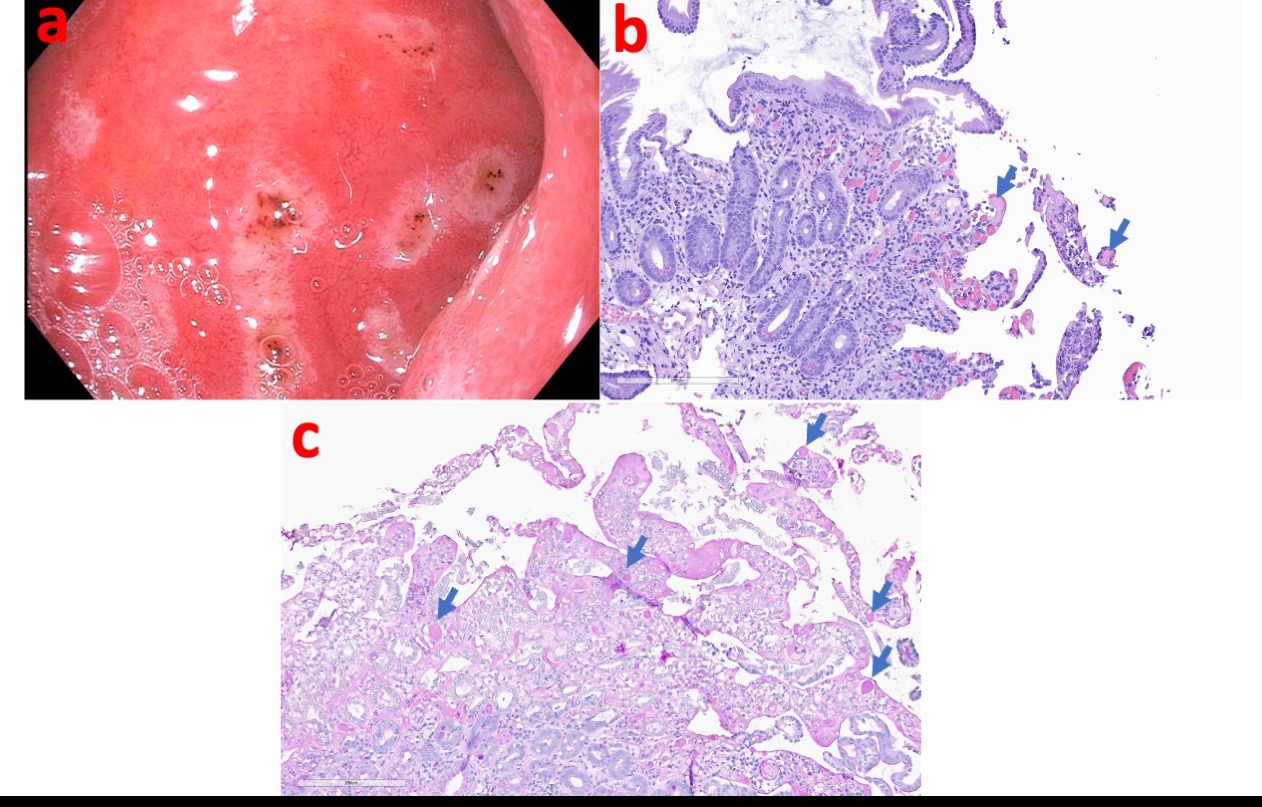Back
Poster Session E - Tuesday Afternoon
E0605 - Cryoglobulin-Mediated Duodenitis in an HCV Patient With Sustained Virologic Response
Tuesday, October 25, 2022
3:00 PM – 5:00 PM ET
Location: Crown Ballroom

Neela Easwar, MD
NewYork Presbyterian-Weill Cornell Medical Center
New York, NY
Presenting Author(s)
Neela Easwar, MD, Adam Buckholz, MD, MS, Jose Jessurun, MD, Robert Brown, MD, MPH
NewYork Presbyterian-Weill Cornell Medical Center, New York, NY
Introduction: Mixed cryoglobulinemia syndrome (MCS) is caused by chronic hepatitis C virus (CHC) in >90% of cases. The classic presentation of MCS includes palpable purpura, renal dysfunction, and arthralgias, but other life-threatening manifestations can occur, including pulmonary, hepatic, and mesenteric involvement. Nearly all patients experience resolution of MCS after sustained virologic response (SVR), but relapse can rarely occur. We present a patient who was found to have asymptomatic cryoglobulin-mediated duodenitis after years of SVR.
Case Description/Methods: A 62-year-old man with a history of type 2 diabetes, hypertension, and prior kidney transplant was treated with an unknown direct acting antiviral for CHC at an outside center in 2018. He then presented after likely cirrhosis was incidentally diagnosed on an abdominal CT. He appeared clinically compensated with no complaints, and vital signs and laboratory testing were consistent with compensated disease. Lack of active viral hepatitis was confirmed. A screening endoscopy found no varices but was notable for scattered mucosal discoloration and erosion throughout the duodenum. Biopsies demonstrated numerous hyaline Periodic acid-Schiff-diastase positive thrombi consistent with intravascular cryoglobulin deposits. Serum cryoglobulins were not detected, another cause of persistent cryoglobulinemia was not identified, and there was no prior diagnosis of MCS. Therapy was deferred, as the patient was asymptomatic.
Discussion: Mesenteric involvement is a rare (2.6% of all extrahepatic CHC) but potentially devastating complication of CHC-associated MCS. It can cause intestinal ischemia and perforation, and its presence is independently associated with increased mortality. Treatment of underlying CHC generally induces remission, but this patient demonstrated active MCS-related duodenitis years after achieving SVR. Persistent MCS after SVR due to sustained clonal production of cryoglobulins has been rarely reported, although our patient had no evidence of systemic involvement. Persistent MCS after SVR should prompt HCV testing to assess for relapse. If no relapse is found, as in this patient, a different underlying condition should be considered, including B-cell lymphoma, HIV, HBV, or autoimmune disease. While MCS incidence is decreasing concurrently with HCV burden, this case illustrates that MCS is possible even years after SVR, an unusual finding warranting further investigation.

Disclosures:
Neela Easwar, MD, Adam Buckholz, MD, MS, Jose Jessurun, MD, Robert Brown, MD, MPH. E0605 - Cryoglobulin-Mediated Duodenitis in an HCV Patient With Sustained Virologic Response, ACG 2022 Annual Scientific Meeting Abstracts. Charlotte, NC: American College of Gastroenterology.
NewYork Presbyterian-Weill Cornell Medical Center, New York, NY
Introduction: Mixed cryoglobulinemia syndrome (MCS) is caused by chronic hepatitis C virus (CHC) in >90% of cases. The classic presentation of MCS includes palpable purpura, renal dysfunction, and arthralgias, but other life-threatening manifestations can occur, including pulmonary, hepatic, and mesenteric involvement. Nearly all patients experience resolution of MCS after sustained virologic response (SVR), but relapse can rarely occur. We present a patient who was found to have asymptomatic cryoglobulin-mediated duodenitis after years of SVR.
Case Description/Methods: A 62-year-old man with a history of type 2 diabetes, hypertension, and prior kidney transplant was treated with an unknown direct acting antiviral for CHC at an outside center in 2018. He then presented after likely cirrhosis was incidentally diagnosed on an abdominal CT. He appeared clinically compensated with no complaints, and vital signs and laboratory testing were consistent with compensated disease. Lack of active viral hepatitis was confirmed. A screening endoscopy found no varices but was notable for scattered mucosal discoloration and erosion throughout the duodenum. Biopsies demonstrated numerous hyaline Periodic acid-Schiff-diastase positive thrombi consistent with intravascular cryoglobulin deposits. Serum cryoglobulins were not detected, another cause of persistent cryoglobulinemia was not identified, and there was no prior diagnosis of MCS. Therapy was deferred, as the patient was asymptomatic.
Discussion: Mesenteric involvement is a rare (2.6% of all extrahepatic CHC) but potentially devastating complication of CHC-associated MCS. It can cause intestinal ischemia and perforation, and its presence is independently associated with increased mortality. Treatment of underlying CHC generally induces remission, but this patient demonstrated active MCS-related duodenitis years after achieving SVR. Persistent MCS after SVR due to sustained clonal production of cryoglobulins has been rarely reported, although our patient had no evidence of systemic involvement. Persistent MCS after SVR should prompt HCV testing to assess for relapse. If no relapse is found, as in this patient, a different underlying condition should be considered, including B-cell lymphoma, HIV, HBV, or autoimmune disease. While MCS incidence is decreasing concurrently with HCV burden, this case illustrates that MCS is possible even years after SVR, an unusual finding warranting further investigation.

Figure: Figure 1: a) Scattered mucosal discoloration and erosion seen in the duodenum consistent with ischemic injury. b) Duodenal mucosa with intravascular hyalin thrombi indicated by the arrows. c) Periodic acid-Schiff-diastase stain showing multiple intravascular thrombi indicated by the arrows.
Disclosures:
Neela Easwar indicated no relevant financial relationships.
Adam Buckholz indicated no relevant financial relationships.
Jose Jessurun indicated no relevant financial relationships.
Robert Brown indicated no relevant financial relationships.
Neela Easwar, MD, Adam Buckholz, MD, MS, Jose Jessurun, MD, Robert Brown, MD, MPH. E0605 - Cryoglobulin-Mediated Duodenitis in an HCV Patient With Sustained Virologic Response, ACG 2022 Annual Scientific Meeting Abstracts. Charlotte, NC: American College of Gastroenterology.
